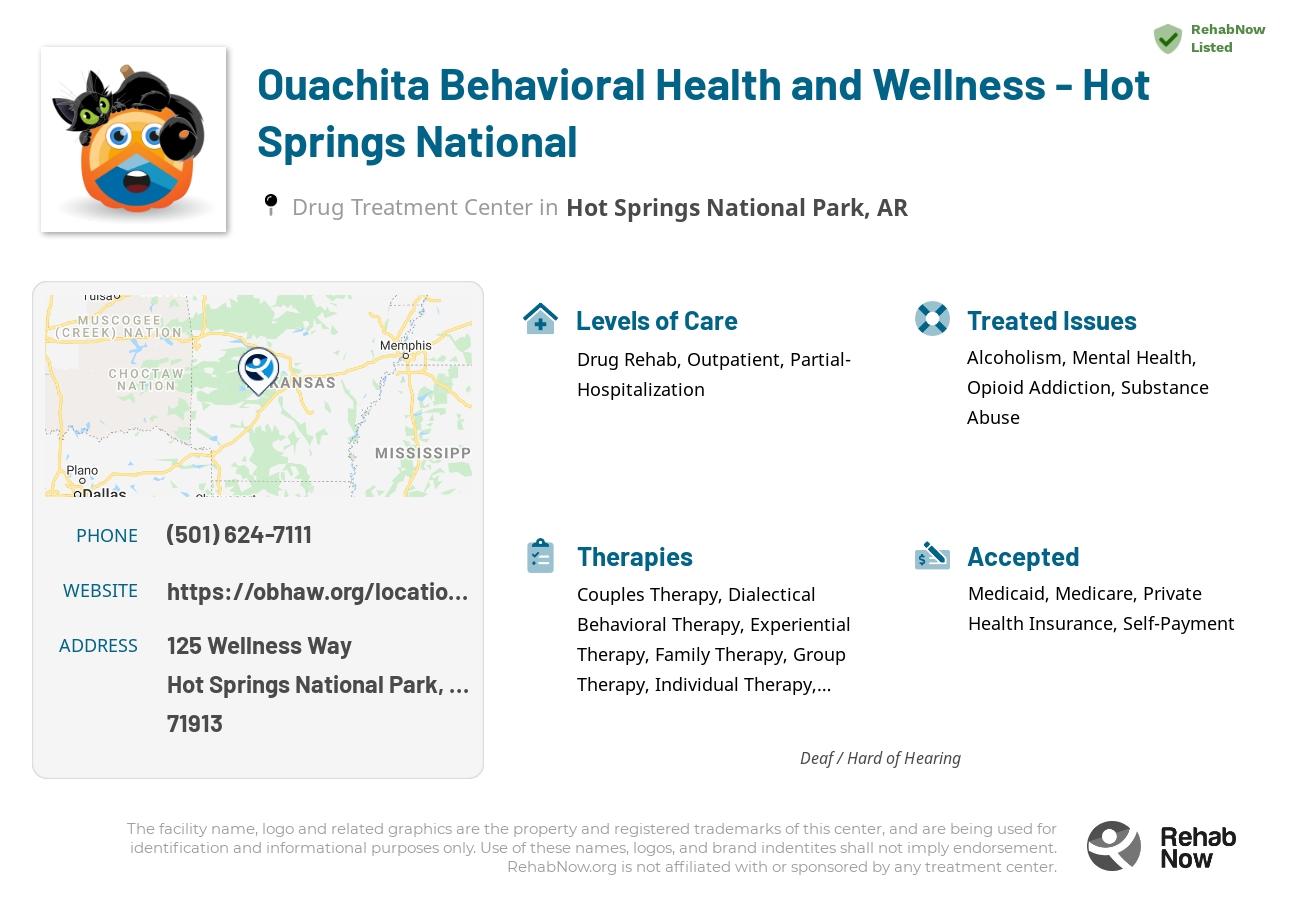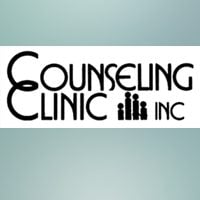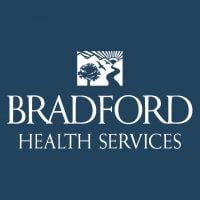Ouachita Behavioral Health and Wellness - Hot Springs National
Drug Rehab Center in Hot Springs National Park, Arkansas
Ouachita Behavioral Health and Wellness - Hot Springs National Park is an accredited addiction treatment center that provides comprehensive care and personalized treatment plans, as well as health education services, vocational training, and nutritional therapy to help individuals achieve lasting recovery.
About This Arkansas Facility
Nestled in the vibrant Hot Springs National Park, Arkansas, Ouachita Behavioral Health and Wellness shines as a beacon of hope for adults and teens striving towards sobriety. Emphasizing outpatient alcohol and drug rehabilitation, it stands out for its inclusive services tailored for a diverse clientele, including medication-assisted treatment and specialized programs for adolescents and individuals navigating the challenges of homelessness or the criminal justice system.
- Holistic Outpatient Care: Offers comprehensive outpatient treatment, including medication-assisted treatment with Suboxone, and cognitive behavioral and motivational interviewing techniques.
- Targeted Adolescent Programs: Features programs specifically designed for teens, incorporating recovery learning from peers and support for parents.
- Wraparound Aftercare Services: Provides an array of aftercare options aimed at ensuring long-term recovery, such as ongoing support groups, employment assistance, and housing transition programs.
Accredited by JCAHO, Ouachita Behavioral Health and Wellness prides itself on delivering high-quality care, accepting most major insurance plans, including Cigna and Blue Cross Blue Shield. Their embrace of evidence-based approaches like cognitive behavioral therapy and motivational interviewing underpins their commitment to aiding clients in achieving and maintaining sobriety.
Addressing a range of addiction and mental health issues, from alcoholism to opioid addiction, the facility offers a suite of treatment methods, including dialectical behavior therapy and trauma therapy. Through personalized treatment plans, they ensure that each client’s unique recovery needs are met, offering support through every step towards a sober, healthier life.
Genders
Ages
Modality
Additional
Accreditations

JCAHO
Conditions and Issues Treated
People who abuse drugs are likely to suffer from an addiction, which can cause serious health problems. When it comes to helping drug abusers get sober, there are many options to choose from. It is essential to state that there is no “”correct”” way of doing things. People are different, and they need different types of help to get over their addiction.
Many people who struggle with opioid addiction need to attend specific programs like methadone , Suboxone or Vivitrol clinics.
These types of programs will provide the patient with legal, prescription medications that can help them overcome their cravings for illegal opioids like heroin or fentanyl . If the patient has a chronic condition like Hepatitis C, they must undergo treatment before they can begin taking these medications.
Levels of Care Offered at Ouachita Behavioral Health and Wellness - Hot Springs National
This center offers a variety of custom treatment tailored to individual recovery. Currently available are Drug Rehab, Outpatient, Partial-Hospitalization, with additional therapies available as listed below.
Outpatient treatment programs provide drug and alcohol addiction treatment through individual sessions with a counselor, group therapy, 12-step meetings, and other activities to help individuals gain sober living skills. Most programs are designed for those individuals who have completed a medically supervised detoxification program and provide opportunities for clients to begin the process of early recovery.
Outpatient programs also offer a level of medical support as needed and psychological backing through therapy. Clients are encouraged to live at home, though there may be some flexibility regarding this requirement based on the circumstances and needs of each patient.
Outpatient treatment is perhaps the most common type of dual diagnosis program available. It does not pose a significant financial burden on patients. However, it is essential to note that outpatient treatment does not provide the support and supervision given in residential programs. Some addicts may need this level of support to maintain their sobriety.
Partial Hospitalization Program, or PHP, is a type of drug addiction rehabilitation in the patient’s home. Patients often have to come into Ouachita Behavioral Health and Wellness - Hot Springs National for treatment on weekday evenings and weekends. They must also attend an intensive outpatient program at least 9 hours per week while attending PHP. The patient will meet with a counselor or therapist to help them work through their addiction issues. This type of treatment is used for patients who can go out among society but are at risk of relapsing due to continued exposure to drugs or alcohol.
Therapies & Programs
Therapy sessions focused on the individual addict can provide much-needed guidance as they work toward overcoming their addiction. These types of sessions typically involve guidance from a therapist, who will help addicts identify and process their feelings and cravings.
During these sessions, addicts may develop plans for coping with the triggers that typically lead to relapse and learn how to avoid those triggers during their recovery process.
If you are looking for drug recovery, couples therapy can be a great option. This type of therapy can help rebuild trust and joy in relationships that may have been damaged by addiction. It can also help reduce the dysfunctional behavior in a relationship that may trigger addiction. A patient’s partner will be involved in the process. They can also benefit from therapy, especially if they are trying to live with an addict.
The main goal of family therapy for drug addiction is to create an environment where communication can occur without judgment, hostility, or blame that often occurs within a family.
Family therapy is a type of group problem-solving that aims to improve communication and relationships between the patient, their family, and sometimes friends. The therapist is with the family as they learn to communicate with each other differently, especially with the addict when s/he is using.
The family can learn to reduce their enabling behavior or rally together and support each other during tough times. The patient also learns how to deal with their addiction and maintain sobriety while interacting with the family.
Different types of addiction treatment services are available. Within this article, group therapy is of interest due to its high success rate compared to individual therapy. Group therapy settings are beneficial because they allow recovering addicts to build a strong support network.
Benefits of group therapy are:
- Reduces feelings of isolation
- Immediate access to social support in the form of fellow addicts in recovery
- Lowers risk of relapse
- Increases rate of sobriety
- Builds coping skills that can be applied to everyday life
Trauma Therapy is a form of therapy that involves working with a patient to help them process and understand the past trauma(s) in their life. The idea behind it is that while some people can experience traumatic events and not have lasting psychiatric symptoms, many others will. In these cases, memories of the event get hidden from consciousness but continue to influence how the person processes and copes with things in their life. They may avoid situations that resemble what happened or become suddenly angry or irritated to a situation that reminds them of a past event.
With the help of a therapist, people can go back over memories and experiences. This helps them understand why they are having problems coping with certain situations and how they can change how they think and react to things. This therapy is typically done using techniques such as visualization, discussion, and writing down thoughts and feelings.
Trauma therapists will work with clients to help them understand their past and present relationships. Many times, patients may believe that something is inherently wrong with them or that they are unworthy of love. A therapist aims to correct these negative feelings and behaviors by helping the person realize that their actions do not reflect who they truly are.
One of the main goals of trauma therapy is to help clients express their emotions and talk about what they are feeling. This benefits both to increase awareness of how certain events have impacted them in the past and enables patients to realize that they can make changes in their lives.
Dialectical Behavior Therapy is a cognitive-behavioral therapy that helps addicts balance their thoughts and emotions to change their behavior. It was designed for those vulnerable to self-harm and suicidal thoughts and aims to help patients understand the connection between their feelings, emotions, and behaviors. It is effective for those whose addictions and behaviors stem from severe mental health issues.
Cognitive Behavioral Therapy (CBT) is used by drug treatment centers to help addicts comprehend the causes of their substance abuse and the consequences that follow. Through CBT, clients learn to recognize and avoid high-risk situations and cope with challenging situations when they arise.
CBT treatment often includes a combination of individual therapy, group therapy, lectures, and other activities. The treatment’s goal is to help addicts gain self-control and maintain abstinence from drugs and alcohol over the long term so that an addict can get sober and lead a more productive life.
CBT is particularly effective in helping people overcome their drug problems, especially people whose drug abuse is motivated by self-defeating beliefs and emotions.
Good nutrition can be difficult for people recovering from addiction because they may not feel like eating while they are experiencing the physical and emotional side effects of detoxing.
Nutrition therapy can help addicts in the following ways:
- Helps individuals to understand which foods promote good health and support recovery that will assist them during detox
- Provides guidance and education in Hot Springs National Park, Arkansas about how to maintain a nutritious diet so they can stay healthy during recovery
- Improves their overall health and well-being, which can reduce the severity of substance withdrawal symptoms.
Nicotine replacement therapies are effective because they provide you with the nicotine you are addicted to without inhaling carcinogens from cigarettes. Some types of NRT include nicotine gum, nicotine patches (transdermal systems), nasal spray, and lozenges. The benefits of using NRT can include reducing the risk of heart disease and cancer.
Patient Experience
Experiential Therapy at Ouachita Behavioral Health and Wellness - Hot Springs National
Experiential therapy is a form of psychotherapy where patients are asked to engage in activities such as role-play, poetry writing, music composition, exercising, or journaling to help process intense feelings. The aim of the therapy is to help patients access deeper, often hidden emotions by helping them explore their own body and mind.
Payment Options Accepted
For specific insurance or payment methods please contact us.
Is your insurance accepted?
Ask an expert, call (888) 674-0062
Ouachita Behavioral Health and Wellness Associated Centers
Discover treatment facilities under the same provider.
- Ouachita Behavioral Health and Wellness - Malvern in Malvern, AR
- Ouachita Behavioral Health and Wellness - Mount Ida in Mount Ida, AR
- Ouachita Behavioral Health and Wellness - Arkadelphia in Arkadelphia, AR
- Ouachita Behavioral Health and Wellness - Glenwood in Glenwood, AR
Learn More About Ouachita Behavioral Health and Wellness Centers
Additional Details
Specifics, location, and helpful extra information.
Hot Springs National Park, Arkansas 71913 Phone Number(501) 624-7111 Meta DetailsUpdated April 15, 2024
Staff Verified
Patient Reviews
There are no reviews yet. Be the first one to write one.
Hot Springs National Park, Arkansas Addiction Information
Arkansas has one of the highest rates of substance abuse and addiction in the nation for drug overdoses. Methamphetamines and prescription opioids are by far the most widely abused drugs in the state. Despite the high rates, Arkansas ranked only 25th in the for drug overdose deaths in 2013.
About 2,213 people struggle with addiction to drugs or alcohol in Hot Springs National Park. This means about 10% of the population is addicted to these substances. The most commonly abused drugs in the state are marijuana, opioids, and methamphetamine. Counseling can provide individuals with tools to cope with triggers and cravings, and medication-assisted treatment uses medication to help alleviate withdrawal symptoms and reduce the risk of relapse.
Treatment in Nearby Cities
- Pocahontas, AR (172.0 mi.)
- Mulberry, AR (90.4 mi.)
- Searcy, AR (93.6 mi.)
- Arkadelphia, AR (23.8 mi.)
- Eureka Springs, AR (139.0 mi.)
Centers near Ouachita Behavioral Health and Wellness - Hot Springs National
The facility name, logo and brand are the property and registered trademarks of Ouachita Behavioral Health and Wellness - Hot Springs National, and are being used for identification and informational purposes only. Use of these names, logos and brands shall not imply endorsement. RehabNow.org is not affiliated with or sponsored by Ouachita Behavioral Health and Wellness - Hot Springs National.










